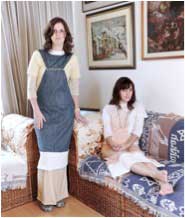Whereas before, Adam and Eve's bodies and faces shone with a light that made it evident that they were spiritual beings, the moral uncertainty created by eating the Tree's fruit changed their physical appearance. Now only their faces retained a glimmering of the soul's light. Needless to say, this posed a problem: Bodies could be seen as mere animal bodies, instead of servants of the soul. To make sure they were perceived accurately -- to retain their human dignity -- Adam and Eve immediately covered up. The world may be superficial, but the right clothing keeps the focus where it should be.
 While the issue of wearing clothing is today under debate, it is clear that showing off your curvature of adipose tissue is not always the best way to showcase your inner self. For all people with a sense of God-given dignity (and even those without), dressing more formally indicates that what's inside is paramount. This is generally called the soul or -- if you prefer -- the evolutionary quirk that pricks us to posit something more than the body. In the Bible, women and Torah scholars are encouraged to dress extra carefully because their inner worlds are considered especially rich. Even today the general rule is still: The more respect you want, the more modestly you should dress. A wise woman won't show up to a job interview dressed like Britney Spears (unless she is interviewing for a spot in an MTV video).
While the issue of wearing clothing is today under debate, it is clear that showing off your curvature of adipose tissue is not always the best way to showcase your inner self. For all people with a sense of God-given dignity (and even those without), dressing more formally indicates that what's inside is paramount. This is generally called the soul or -- if you prefer -- the evolutionary quirk that pricks us to posit something more than the body. In the Bible, women and Torah scholars are encouraged to dress extra carefully because their inner worlds are considered especially rich. Even today the general rule is still: The more respect you want, the more modestly you should dress. A wise woman won't show up to a job interview dressed like Britney Spears (unless she is interviewing for a spot in an MTV video).
After all, "the greatness of the daughter of the king is on the inside" (Psalms 45:14). A recurrent biblical theme is protecting the inner self, which is a metaphor for the spiritual realm. Only the high priest could enter the Holy of Holies, and only on Yom Kippur. The holiest of all Jewish prayers is said in a whisper. It was Hanna, the mother of Samuel, who prayed for a child by barely moving her lips. Initially, Eli the High Priest thought she was drunk, but later realized she was onto something. From then on, the Jews mouthed their most important prayers quietly. The most significant moments are always cloaked in hiddenness.
Even God Himself uses the veil of nature to give us the opportunity to find Him. No wonder, then, that public displays of affection are seen as cheapening. If you want to show everyone, how special can it be? This is perhaps the source of the public's suspicion of "TomKat" -- Tom Cruise and Katie Holmes's overexposed romance. I don't think people are cynical to suspect there is something a bit off about Tom's repeated protestations of love, his couch-jumping on Oprah, or all those kisses staged for the cameras. Such a blatant disregard for modesty seems, rather, to betray a lack of profound feeling -- at least on the part of one of them.
That there is "a blessing in something hidden from the eye" extends to the teaching of Torah. Ideally, the Torah's teachings are to be passed on orally from teacher to student, as opposed to the detached study of texts. This private, even intimate relationship between teacher and student leaves an opportunity for clarification and more accurate transmission. Otherwise, you might mistranslate "rays of light" as horns and imagine a horned Moses (as did Michelangelo).
Jewish tradition teaches that Moses recorded God's words, which make up the Torah, where it is written that Moses was the most humble of men. But would a truly humble person record that he was so humble? Actually, yes. True humility isn't about playing down your strengths. It's knowing what they are, but knowing that they are God-given. Similarly, sexual modesty also derives from knowing your true worth. Studies consistently show that the higher a girl's self-worth, the more likely she is to wait for sex.
Even after the wedding, an ongoing concern for modesty preserves a married couple's sensitivity and attraction to each other. Orthodox men make a concerted effort not to look at undressed women who aren't their wives, whether it's on a beach or at a newsstand. They avert their gaze. Another place for modesty in Jewish marriages is during the period each month when the couple abstains from physical intimacy. Traditional couples say they follow this commandment because it is God's will, but there are also well-known side effects. Taking a break from physical intimacy tends to foster friendship and improved communication, and also makes the wife "as dear to her husband as when she entered the marriage canopy" (Tractate Niddah 31b).
If modesty counteracts marital boredom, then much of what we understand about desire -- "if it feels good, do it" -- is plain wrong. In contemporary understanding, modesty is about "repressing" sexuality. You either express your sexuality through multiple partners, or you repress it by waiting for and remaining with "just" your spouse. Judaism challenges this false dichotomy. We are taught that "the Divine Presence dwells in a home only when a man is married and he cohabits with his wife" (Zohar, I, 122a). Why?




